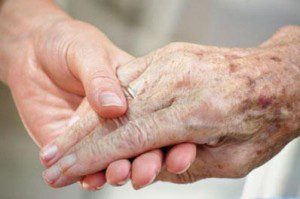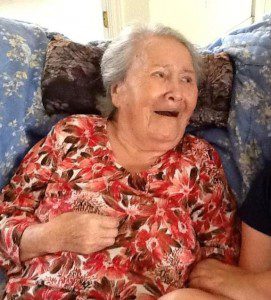 Isabel, ninety years old, bed-ridden, unintelligible, unable to communicate, afflicted with Alzheimer’s disease. This is my grandmother—now. To see her now arouses pity, but to have seen her THEN… Oh what a woman she was.
Isabel, ninety years old, bed-ridden, unintelligible, unable to communicate, afflicted with Alzheimer’s disease. This is my grandmother—now. To see her now arouses pity, but to have seen her THEN… Oh what a woman she was.
She wasn’t the spunky, sassy kind of lady that was strong and daring. No, she was different and strong in her own way. She was not worldly or proud; she was, however, kind and generous with what she had and with what she was able to give, and that was all of herself.
She loved to feed people. Walking into her house afterschool, watching her make tortillas, peeking into her refrigerator. “What can I get you? What do you want to eat?” My grandfather’s lunch on the kitchen table—a sandwich wrapped in foil, a pickle spear, a side of beans and chile. She prepared for me a homemade hamburger on sandwich bread; my mom came early to pick me up, “But she hasn’t eaten yet.” She wrapped it in foil. “Here, take it with you, Mihijita.”
She grew up poor and hungry. She knew how important it was to be fed. I walked into her house when the disease had started to set in. She said she had gotten so busy that day—laundry, cleaning, cooking. Then she felt “that feeling”. “What feeling was that, Grandma?” “You know, that feeling I felt when I was a little girl… I got so busy, I forgot to eat.” Her memory of childhood was hunger. She knew how important it was to be fed. She is on a feeding tube—now. She can’t eat; she forgot how to swallow.
She loved to care for people. She would rub my sore shoulders and legs. Give me atole when I had a tummy ache. “Grandma, the baby kicked a cactus and there are needles in his little toes. What do I do?” She’s the first person I called. She would have been a great nurse. Ironically, she needs full time nursing for herself—now.
“Grandma, help me hem this bridesmaid’s dress.” “Grandma, those new blouses with the lace on top are so pretty, but expensive.” “Ooh– I can make you one, Mihijita.” And she did. She made me clothes and helped me fix the ones I had. Now we bathe and dress her.
I remember her devotion to God; she prayed the Rosary, went to Mass with the little piece of lace pinned to her hair. She always said, “God bless you” or “God be with you.” I admired her devotion. She can’t really receive the Eucharist now– only a morsel to dissolve on her tongue.
Isabel, ninety years old, bed-ridden, unintelligible, unable to communicate, afflicted with Alzheimer’s disease. This is my grandmother—now. Her life seems so inane, so futile, so desperate now.
 But I cannot define her by this latter portion of her life, five years out of ninety. Her life is defined by it all: the care of a wife, mother, grandmother, friend. She prayed for me and my entire family daily. I know in my heart she still prays, even if she doesn’t know. She suffers; she suffered. This suffering has purpose and brings her closer to God. She looks at each one of us with a look of love, even if she doesn’t know who we are. So, I will stroke her hair, wash her, bathe her, dress her to show her I believe she is still alive in there– all the while I pray for God to take her to His kingdom, in His own time. She deserves it.
But I cannot define her by this latter portion of her life, five years out of ninety. Her life is defined by it all: the care of a wife, mother, grandmother, friend. She prayed for me and my entire family daily. I know in my heart she still prays, even if she doesn’t know. She suffers; she suffered. This suffering has purpose and brings her closer to God. She looks at each one of us with a look of love, even if she doesn’t know who we are. So, I will stroke her hair, wash her, bathe her, dress her to show her I believe she is still alive in there– all the while I pray for God to take her to His kingdom, in His own time. She deserves it.
